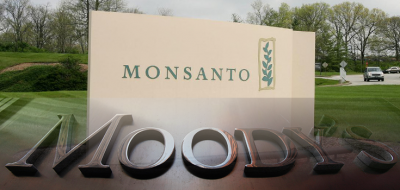Credit Rating Company Moody’s Changes Monsanto’s Investor Rating to “Negative”

Approximately $8 billion in debt securities are affecting a popular investor’s service decision about one of biotech’s biggest. Investing credit rating company Moody’s has affirmed that Monsanto’s new rating is being downgraded from ‘neutral’ to ‘negative’ following Syngenta’s announcement that it has refused Monsanto’s unsolicited bid of CHF449 per Syngenta share in a combination of cash and stock.
Monsanto’s offer would have valued another biotech bully at a mere US$20 billion paid in cash. For investors in Monsanto, Moody’s calls their aggressive attempt at takeover a “heightened event risk” due to their more aggressive financial policy.
Indeed – Monsanto’s financial policy seems to match their aggressive actions elsewhere – from bullying federal judges to trying to orchestrate a trade monopoly through the Trans Pacific Partnership (TPP).
Moody’s also doesn’t seem to feel confident that Monsanto could come up with the cash even if Syngenta had accepted their deal. John Rogers, Senior Vice President at Moody’s said:
“Monsanto’s bid is indicative of a more aggressive financial policy, especially after it has levered up to undertake a sizable share repurchase program over the past 10 months.”
As per Moody’s ratings rationale, the A3 long-term debt and Prime-2 commercial paper ratings reflect Monsanto’s leadership position in genetically modified (GM) and hybrid seeds, modest leverage (1.6x Net Debt/EBITDA, Retained Cash Flow/Net Debt of 45%), and excellent liquidity.
However, Moody’s doesn’t seem to take into account the fact that consumers and farmers are more increasingly refusing GM products – whether it’s the glyphosate that Monsanto sells via Round Up or the Round Up Ready crops they push on farmers throughout the world.
There have been increasing farmer uprisings against Monsanto, and the demand for organic is booming so much that the US is now importing more organic food than they are growing. This doesn’t bode well for a company that makes its cash by lying, stealing, and poisoning.
Moody’s also bases its assessment on standard adjustments to Monsanto’s financial statements (which currently show debt at $1.8 billion – $1.6 billion in operating leases, and $200 million in pensions for their employees).
Furthermore, Moody’s states “Monsanto’s market position is supported by the largest germplasm library in the industry, technology licensing agreements with its main competitors and clearly defined research pipeline.”
It doesn’t mention that Monsanto’s research pipeline is all paid for and that the company has an entire department dedicated to discounting any scientific research which paints them in an unfavorable light. This is obviously not a sustainable way to do business, since even the World Health Organization has called glyphosate ‘probably carcinogenic’ and organizations everywhere are now demanding a ban on glyphosate.
We can only hope that the Monsanto/Syngenta merger does not happen. It would result in a bloated agricultural chemical giant capable of dominating the seed market at almost three times the rate of its nearest competitor.
Follow us: @naturalsociety on Twitter | NaturalSociety on Facebook

